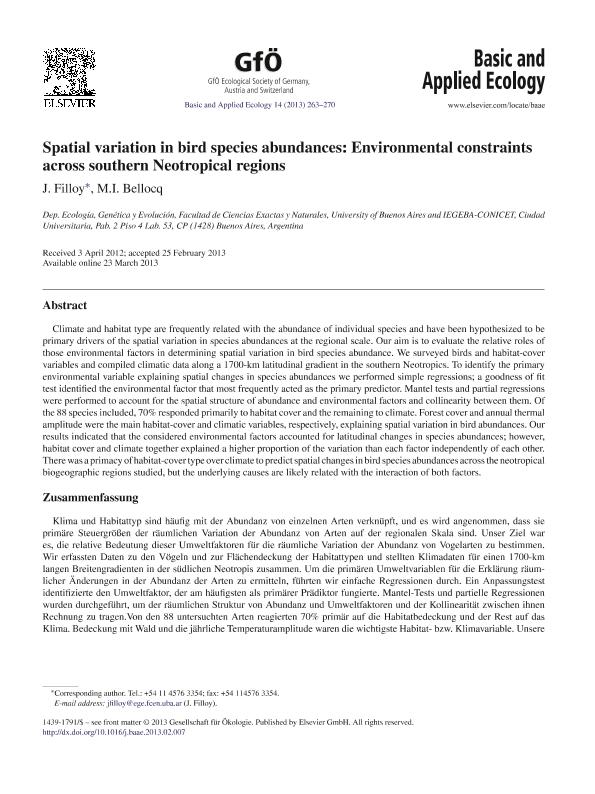Mostrar el registro sencillo del ítem
dc.contributor.author
Filloy, Julieta

dc.contributor.author
Bellocq, Maria Isabel

dc.date.available
2015-06-16T21:12:26Z
dc.date.issued
2013-03-23
dc.identifier.citation
Filloy, Julieta; Bellocq, Maria Isabel; Spatial variation in bird species abundances: Environmental constraints across southern Neotropical regions; Elsevier Gmbh, Urban & Fischer Verlag; Basic And Applied Ecology; 14; 3; 23-3-2013; 263-270
dc.identifier.issn
1439-1791
dc.identifier.uri
http://hdl.handle.net/11336/787
dc.description.abstract
Climate and habitat type are frequently related with the abundance of individual species and have been hypothesized to be primary drivers of the spatial variation in species abundances at the regional scale. Our aim is to evaluate the relative roles of those environmental factors in determining spatial variation in bird species abundance. We surveyed birds and habitat-cover variables and compiled climatic data along a 1700-km latitudinal gradient in the southern Neotropics. To identify the primary environmental variable explaining spatial changes in species abundances we performed simple regressions; a goodness of fit test identified the environmental factor that most frequently acted as the primary predictor. Mantel tests and partial regressions were performed to account for the spatial structure of abundance and environmental factors and collinearity between them. Of the 88 species included, 70% responded primarily to habitat cover and the remaining to climate. Forest cover and annual thermal amplitude were the main habitat-cover and climatic variables, respectively, explaining spatial variation in bird abundances. Our results indicated that the considered environmental factors accounted for latitudinal changes in species abundances; however, habitat cover and climate together explained a higher proportion of the variation than each factor independently of each other. There was a primacy of habitat-cover type over climate to predict spatial changes in bird species abundances across the neotropical biogeographic regions studied, but the underlying causes are likely related with the interaction of both factors.
dc.format
application/pdf
dc.language.iso
eng
dc.publisher
Elsevier Gmbh, Urban & Fischer Verlag

dc.rights
info:eu-repo/semantics/openAccess
dc.rights.uri
https://creativecommons.org/licenses/by-nc-sa/2.5/ar/
dc.subject
Abundance
dc.subject
Birds
dc.subject
Environmental Gradients
dc.subject
Spatial Patterns
dc.subject.classification
Ecología

dc.subject.classification
Ciencias Biológicas

dc.subject.classification
CIENCIAS NATURALES Y EXACTAS

dc.title
Spatial variation in bird species abundances: Environmental constraints across southern Neotropical regions
dc.type
info:eu-repo/semantics/article
dc.type
info:ar-repo/semantics/artículo
dc.type
info:eu-repo/semantics/publishedVersion
dc.date.updated
2016-03-30 10:35:44.97925-03
dc.journal.volume
14
dc.journal.number
3
dc.journal.pagination
263-270
dc.journal.pais
Alemania

dc.journal.ciudad
ALEMANIA
dc.description.fil
Fil: Filloy, Julieta. Consejo Nacional de Invest. Científ.y Técnicas. Oficina de Coordinación Administrativa Ciudad Universitaria. Instituto de Ecología, Genética y Evolución de Bs. As; Argentina
dc.description.fil
Fil: Bellocq, Maria Isabel. Consejo Nacional de Invest. Científ.y Técnicas. Oficina de Coordinación Administrativa Ciudad Universitaria. Instituto de Ecología, Genética y Evolución de Bs. As; Argentina
dc.journal.title
Basic And Applied Ecology

dc.relation.alternativeid
info:eu-repo/semantics/altIdentifier/doi/http://dx.doi.org/10.1016/j.baae.2013.02.007
Archivos asociados
